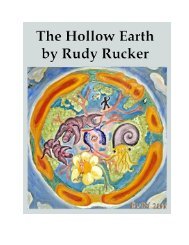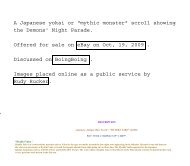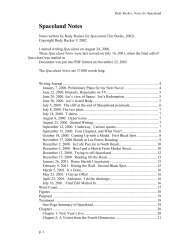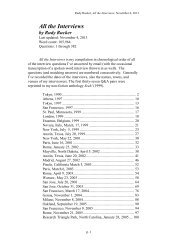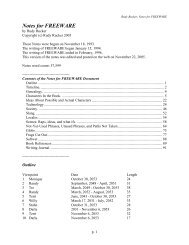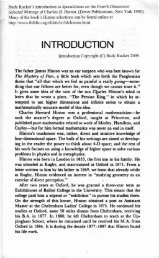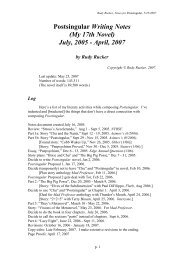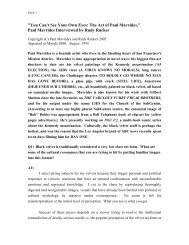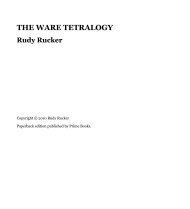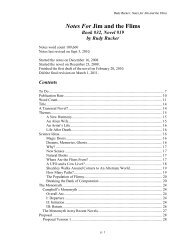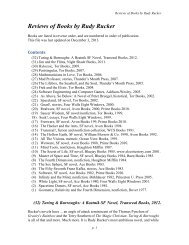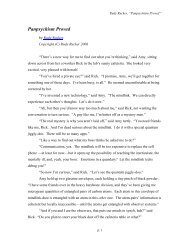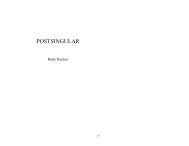Notes for the Lifebox, the Seashell, and the Soul - Rudy Rucker
Notes for the Lifebox, the Seashell, and the Soul - Rudy Rucker
Notes for the Lifebox, the Seashell, and the Soul - Rudy Rucker
You also want an ePaper? Increase the reach of your titles
YUMPU automatically turns print PDFs into web optimized ePapers that Google loves.
<strong>Notes</strong> <strong>for</strong> The <strong>Lifebox</strong>, <strong>the</strong> <strong>Seashell</strong>, <strong>and</strong> <strong>the</strong> <strong>Soul</strong>, by <strong>Rudy</strong> <strong>Rucker</strong><br />
Crystals <strong>and</strong> animats don’t have Quantum Mind, do <strong>the</strong>y?<br />
I describe how <strong>the</strong> process of evolution has been mimicked by computer scientists in<br />
<strong>the</strong> disciplines known as genetic algorithms <strong>and</strong> artificial life. And I explain why <strong>the</strong>se<br />
methods don’t actually work <strong>for</strong> practical problems.<br />
Chapter 4: The Mind<br />
Perhaps our greatest hope about computation is that we might be able to make<br />
immortal copies of ourselves. And perhaps <strong>the</strong> greatest fear about computation is that some<br />
computational process such as rogue robots or biotechnology might destroy us all.<br />
The biggest problem in representing everything as a computation is <strong>the</strong> human mind.<br />
It’s not clear that <strong>the</strong> kinds of computation we work with can ever behave at all like a mind.<br />
Quantum computation may hold out a possibility of true AI.<br />
But, as I’ll explain, my feeling is that <strong>the</strong> human mind as one immediately<br />
experiences it is quite unlike <strong>the</strong> working of a st<strong>and</strong>ard digital machine. As Nick Herbert<br />
puts it in his essay, “Holistic Physics, or, An Introduction to Quantum Tantra”<br />
Nick Herbert is one of <strong>the</strong> more colorful characters in Silicon Valley. He started as a<br />
physicist designing hard drives, <strong>and</strong> now he’s become a guru teaching a doctrine of<br />
“Quantum Tantra.” Beneath <strong>the</strong> Cali<strong>for</strong>nia surface, he’s quite serious, with some remarkable<br />
insights about <strong>the</strong> meaning of quantum computation. You might put it like this: if you stop<br />
talking, your mind gets wider.<br />
By <strong>the</strong> high st<strong>and</strong>ards of explanation we have come to dem<strong>and</strong> in physics <strong>and</strong> o<strong>the</strong>r<br />
sciences, we do not even possess a bad <strong>the</strong>ory of consciousness, let alone a good one.<br />
Speculations concerning <strong>the</strong> origin of inner experience in humans <strong>and</strong> o<strong>the</strong>r beings<br />
have been few vague <strong>and</strong> superficial. They include <strong>the</strong> notion that mind is an "emergent<br />
property" of active neuronal nets, or that mind is <strong>the</strong> "software" that manages <strong>the</strong> brain's<br />
unconscious "hardware"...<br />
Half-baked attempts to explain consciousness, such as mind-as-software or mind-asemergent-property<br />
do not take <strong>the</strong>mselves seriously enough to confront <strong>the</strong> experimental<br />
facts, our most intimate data base, namely how mind itself feels from <strong>the</strong> inside.<br />
With Herbert, I am inclined to believe in <strong>the</strong> so-called “quantum mind” <strong>the</strong>sis, which<br />
holds that <strong>the</strong>re is a quantum mechanical aspect to <strong>the</strong> human mind <strong>and</strong> that this aspect lies<br />
quite outside <strong>the</strong> behavior of ordinary computations. We’ll return to this topic in <strong>the</strong> last<br />
chapter of <strong>the</strong> book.<br />
But, as I’ll explain, my feeling is that <strong>the</strong> human mind as one immediately<br />
experiences it is quite unlike <strong>the</strong> working of a st<strong>and</strong>ard digital machine. As Nick Herbert<br />
puts it in his essay, “Holistic Physics, or, An Introduction to Quantum Tantra”<br />
Nick Herbert is one of <strong>the</strong> more colorful characters in Silicon Valley. He started as a<br />
physicist designing hard drives, <strong>and</strong> now he’s become a guru teaching a doctrine of<br />
“Quantum Tantra.” Beneath <strong>the</strong> Cali<strong>for</strong>nia surface, he’s quite serious, with some remarkable<br />
insights about <strong>the</strong> meaning of quantum computation. You might put it like this: if you stop<br />
talking, your mind gets wider.<br />
By <strong>the</strong> high st<strong>and</strong>ards of explanation we have come to dem<strong>and</strong> in physics <strong>and</strong> o<strong>the</strong>r<br />
sciences, we do not even possess a bad <strong>the</strong>ory of consciousness, let alone a good one.<br />
p. 17



